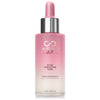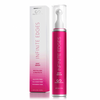
Habits That Can Lead to Premature Baldness In Men

Dealing with a hair loss issue may be stressful and upsetting. While it's OK to lose a few hair strands from time to time, excessive hair loss may lead to a more serious problem: early baldness.
A rising number of men, particularly those who have reached or have passed the age of 30, are experiencing premature baldness. Contrary to common opinion, balding is not a disorder that only affects older men. There are a variety of causes that may cause balding in men of any age.
Along with the decisions you make in your daily life, there are certain habits that may negatively impact the quality of your hair and even cause premature balding, which is an issue that most men face in their twenties, according to research.
Here are nine habits that can lead to premature baldness in men:
1. Skipping Meal
Did you know that skipping meals has a significant negative impact on one's hair? According to multiple studies, depriving yourself of food and failing to consume it on time may prompt your body to devote its limited energy towards critical activities such as aiding your brain and heart's operation rather than hair growth. As a result, eating on time is vital. Always eat foods high in protein, like lentils, seafood, eggs, and so on, because your hair is mostly made of protein and needs to be looked after.
2. Hot Showers
Do you like taking lengthy, steamy showers? If this is the case, you must immediately cease doing so. Showers that are too hot may harm the hair and scalp. It may harm the protective vital oils on the scalp, causing it to become dry and inflamed. Despite the lack of scientific proof, some think that inflammation on the scalp might cause hair follicles to shrink, leading to thinning and receding hairlines.
3. Drinking and Smoking
Several studies show that those who drink and smoke have more hair loss than people who don't. If you smoke, your hair follicles as well as your hormones will be damaged, making it impossible for you to retain thick and full hair. Smoking and drinking may also lead to premature graying, which is why it is important to avoid both.
4. Not Frequently Oiling Your Scalp
Even if you don't wash your hair every day, it's still important to provide it with the nutrition it needs. Using hair oil regularly ensures that your scalp obtains all of the necessary vitamins and minerals. Oiling your scalp every day may be the best way to keep your hair from thinning and going gray early.
5. Over-Styling
Have you been overheating your hair? Well, excessive use of a large number of hair styling products might cause long-term harm to your hair if done repeatedly. If you use hot styling equipment like hair dryers, curling irons, and straighteners on a daily basis, your hair will become dry, brittle, and prone to breakage. If you still can't live without it, cut down on how often you use it to two or even once a week, if possible.
6. Aggressive Combing
Wet hair is more brittle and more likely to break. As a result, one must not comb their hair while it is damp, when it is at its most vulnerable stage. After a head wash, aggressive combing, brushing, or towel-drying may cause damage to the hair follicles and lead to hair loss. Instead, use your fingers to detangle your hair. Make sure you're being kind to yourself as well.
7. Tight HairstylesWhen hair follicles are subjected to too much stress, they may get damaged and infected, causing hair loss. People who have a lot of stress may get traction alopecia, which is a condition that permanently damages the follicle and makes it hard for hair to grow.
8. Taking Certain MedicationsThe use of some medications (such as statins, antidepressants, anti-anxiety meds, and anti-hypertensive drugs) or hormones (such as thyroid replacement pharmaceuticals) may cause hair loss. Birth control pills can also mess with the normal cycle of hair growth, causing hair to enter the resting phase and fall out early.
9. Excessive Exposure to the Sun
When we step outside, the UV rays of the sun begin to have an effect on the flexibility and strength of our hair. It is possible to lose hair if the hair as well as the scalp are exposed to excessive heat and sunshine for a long period of time.

7 Eating Habits That Can Lead To Premature Baldness In Men
In addition to genetics, your food plays a significant influence in determining your hair's health and balding patterns. Certain vitamins in the body are associated with hair growth, and an excess of them may cause hair loss and even baldness. Listed below are a few of the most common diets that might cause hair loss:
High amounts of mercury have been linked to hair loss in several studies. Fish is a typical way for us to get mercury into our system. Mercury is found in a number of fish species, some of which should be avoided. As well as sushi, specific types of mackerel, swordfish, and tuna are included in this category. Instead, you might choose to eat fish like shrimp and salmon that have lower mercury levels.
One of the numerous negative consequences of processed sugar on the body is the deterioration of hair and nail quality. Sugar consumption raises blood glucose levels, requiring the body to create more insulin. A rise in androgens, the male sex hormone, may cause hair follicles to shrink and ultimately lead to early baldness as a consequence.
Keratin is the primary building component of hair. As a result, a lack of protein consumption might lead to hair loss. Protein may be found in lean meat. As a vegetarian, you may get your protein intake from lentils, beans, spinach, and tofu.
Foods with a high glycemic index readily convert to sugar. The health and development of your hair will suffer greatly if you consume these items. When you eat more sugar, your body produces more insulin and androgens, both of which are bad for your hair health. Pasta, white bread, as well as pancakes are all examples of high-glycemic foods.
The eyes and eyesight depend on vitamin A to function properly. However, hair thinning and hair loss may happen if you overeat vitamin A.
Hair that is healthy and glossy requires calcium. Calcium insufficiency may cause the hair and nails to suffer. It's a good idea to include calcium-rich foods like milk and cheese in your diet.
Including iron and zinc in your diet can help your hair stay healthy. These nutrients aid in the production of keratin, which is essential for healthy hair development. For vegetarians, beans are an excellent source of iron and zinc, as are seafood and red meat.
Having lustrous locks is a sign of overall health and self-confidence. In addition to healthier hair, a healthy diet may boost your physical well-being. Avoid these nutritional blunders if you want to maintain good hair.

Treatment
Some Englishmen were instructed to apply chicken poop on their heads or scalps to encourage hair growth a couple of decades ago. Since then, we've made significant progress. Treatment for hair loss is provided by dermatologists, endocrinologists, and trichologists, the last two of whom are experts in the field of balding. There are medications, special combs, and even surgery available to combat hair loss.
As the first line of defense against premature hair loss, doctors will look for reasons or behaviors contributing to hair loss. Typically, a doctor would ask about your lifestyle and habits to see whether you have any of these. The doctor may then prescribe medicines to prevent DTH from forming and reducing follicles, as well as to increase the flow of blood and nutrients to the hair. After that, there is hair transplant surgery and other possibilities.
In a nutshell, the following tips can come handy:
- The first step is to curb hair fall
If you have a terrible tendency to pull out your hair, you should stop. Do something about your tight-pulled haircut. If you don't stop doing it for some time, ironing, perming, or curling your hair might damage it. While these treatments won't damage most people's healthy hair, it's best to take it easy and avoid "damaging" hair styles if hair loss is a significant issue.
Your doctor also recommends a diet high in protein, iron, and calcium. If you're a non-vegetarian, you'll need to consume more meat, eggs, milk, and fish. When consumed in moderation, all of these may aid men with diffuse thinning. Supplementation may be essential for vegans. Hair loss has been linked to iron deficiency, which is more common among vegetarians and pregnant women.
It's also a good idea to take some time to pamper yourself and your hair. Ensure a healthy diet, regular physical activity, and enough rest. Because, as previously said, some studies have connected patchy hair loss to dental infections, you should also brush and floss your teeth regularly. Take excellent care of your hair by using a high-quality shampoo and conditioner, keeping it clean, washing it with water free of salt and chlorine, drying it gently with a towel, and stimulating circulation with a rounded-tooth comb at least once a week.
- Home Remedies
Many traditional home remedies for healthy hair exist, and although they may not completely reverse the effects of severe hair loss, they may undoubtedly delay the progression of the condition. They will also improve the appearance of your current hair. Hibiscus flowers, onion juice, gooseberries, hena, and eggs are some of the ingredients in traditional Indian hair beautification treatments.
If you buy "herbal" or "natural" products from a store, keep in mind that only a handful have been proven or even tried. Generally speaking, a product that has been around for a long time is safer than a product that promises to be innovative. Commercial "natural" treatments (like Avacor), on the other hand, are sometimes marketed as such because they include medications like minoxidil that have been proven to promote hair growth.
Hair loss shampoos, conditioners, various treatments, and vitamins are also readily accessible over the counter. Even if they work for some people, it's always best to see a doctor if you have a lot of hair loss before trying any of these home remedies.
- Hair Loss Medications
It's crucial to see a specialist specializing in treating hair loss issues if you're suffering from early baldness. Ask around, chat with physicians, and see if you can speak with his other patients. It should be easy for the doctor to show images of previous patients he has helped with baldness.
A specialist will first examine you to determine your overall health, which is particularly important if your hairline is still in an early stage. To decide whether or not you have any skin issues that might be contributing to your hair loss, he will examine your scalp and ask questions about your diet and any stresses in your life. In some instances, he may prescribe testing on your thyroid, hemoglobin, or hormone levels.
Steroid injections may be used to treat alopecia areata or scattered hair loss if the affected region is small and the baldness is not widespread.
- Hair Transplant Surgery
Surgery is not the ideal choice if you are a young person losing hair since it might leave you with an unnaturally entire top and scant sides. While surgery may not be a possibility at this point, you may want to save your remaining hair for a future time when it is possible to have it surgically re-done.
An operation is an option, but only if you find a surgeon with expertise in your specific kind of surgery. Don't forget to shop around; clinics that do hair replacement surgery regularly may be able to give you better pricing than more costly facilities that have fewer customers and must charge higher prices to cover their expenses.
Keep in mind that no matter what therapy you decide on, you'll have to wait many months, or maybe a year, before you see results. In order to get the best results, you must constantly monitor your progress and alter your therapy based on the outcomes you are seeing (or not seeing).
Final Thoughts
You might experience hair loss at any age, even before reaching the age of 25. As soon as you notice that you're balding, it's critical that you take immediate action to prevent more hair loss.
Both finasteride and minoxidil are the most effective therapies for male pattern baldness, both in terms of preventing and treating the condition. Start these treatments while you're in your twenties and keep them up as you get older to avoid hair problems as you get older.
If you think that your hair loss is because of a medical condition, medication, or something else, you should talk to your doctor about what you can do about it.






























